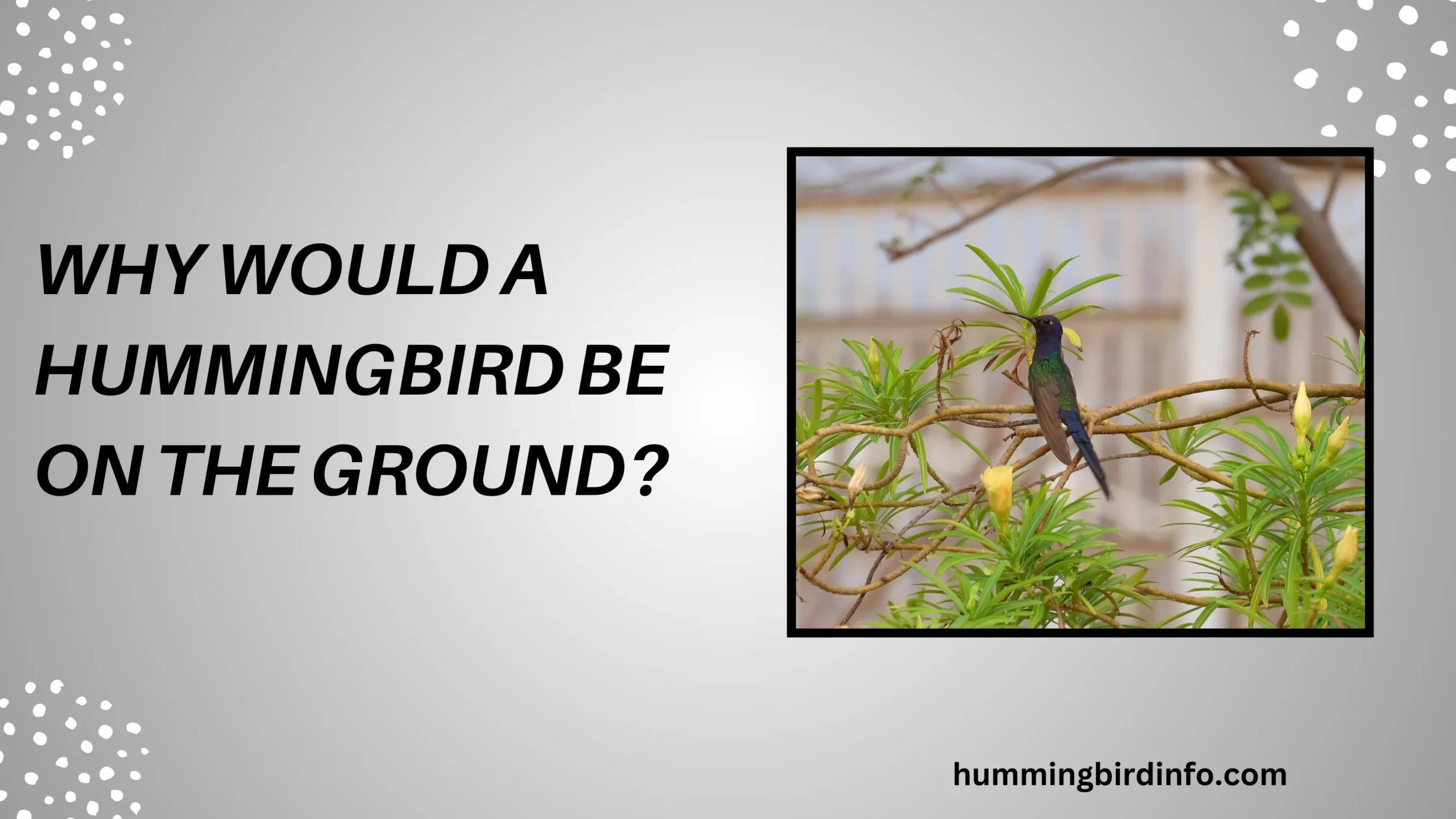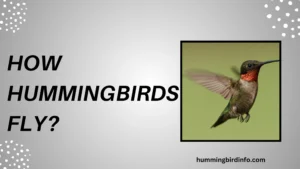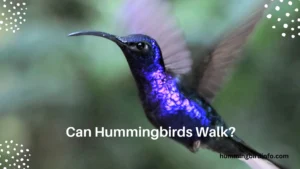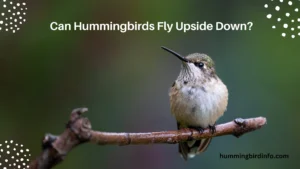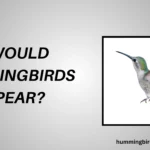Hummingbirds are nature’s tiny aerial wonders, zipping from flower to flower with their dazzling colors and endless energy.
Their ability to hover in midair, dart backward, and move with lightning speed makes them seem almost magical. So when you find a hummingbird sitting still on the ground, it can be deeply unsettling.
These birds are built for flight, not for resting on the earth. Their high metabolism demands near-constant feeding and movement, and their tiny bodies aren’t designed for grounded life. Seeing one motionless or struggling below naturally sparks worry and confusion for bird lovers.
The big question is: why would a hummingbird be on the ground? Sometimes the reason is harmless, like a tired fledgling learning to fly. Other times, it signals injury, illness, or danger.
Understanding the possible causes can help you know when to step in — and how to help. Let’s explore all the reasons why these tiny creatures might end up where they least belong.
Contents
- 0.1 1. Exhaustion and Energy Depletion
- 0.2 2. Injury and Trauma
- 0.3 3. Illness and Disease
- 0.4 4. Nestling and Fledgling Issues
- 0.5 5. Temporary Disorientation and Other Factors
- 0.6 Conclusion
- 1 FAQs
- 1.0.1 Q1. Should I pick up a hummingbird I find on the ground?
- 1.0.2 Q2. How can I tell if a grounded hummingbird needs help?
- 1.0.3 Q3. What should I do if a hummingbird is stunned after hitting a window?
- 1.0.4 Q4. Can I feed a hummingbird sugar water if it looks weak?
- 1.0.5 Q5. When should I call a wildlife rehabilitator?
- 1.0.6 Q6. Could a healthy hummingbird just be resting on the ground?
1. Exhaustion and Energy Depletion
Hummingbirds burn energy at an incredible rate, and even a few hours without food can leave them severely weakened. If a hummingbird cannot find enough nectar, it might collapse from exhaustion onto the ground.

After long migrations or territorial battles with other birds, hummingbirds may land to catch their breath. Their wings beat up to 80 times per second, and even the strongest bird needs a moment to recover sometimes.
Cold weather is another silent enemy; a sudden chill can slow their metabolism, causing hypothermia. A cold, sluggish bird may become too weak to fly, leaving it vulnerable on the ground.
2. Injury and Trauma
Sometimes, a grounded hummingbird is the result of a painful accident. Collisions with windows, cars, or fences are sadly common, as these fast birds often can’t see clear or reflective surfaces.
A hummingbird that survives a predator attack (like from a cat or larger bird) might have hidden wounds. Even if there’s no blood, internal injuries or feather damage can ground them temporarily or permanently.
Entanglement is another risk. Spiderwebs, fishing lines, and garden netting can trap their delicate bodies, leading to serious injuries. A grounded hummingbird may be stuck, exhausted, or too hurt to fly away.
3. Illness and Disease
Illness can sap a hummingbird’s energy so completely that it can’t even lift off. Bacterial, fungal, or viral infections can leave a hummingbird looking fluffed-up and lethargic, lying helplessly on the ground.
External parasites like mites or internal parasites like worms also pose serious threats. Heavy infestations drain their energy and strength, making flight impossible and grounding the bird.
Poisoning from pesticides or contaminated feeders can cause sudden weakness. Even small amounts of toxins can severely affect a hummingbird’s fragile system, sometimes fatally.
4. Nestling and Fledgling Issues
Not every hummingbird on the ground is an adult in trouble. Some may simply be babies learning to fly, experiencing their first awkward encounters with gravity.
Fallen nestlings are very young birds that accidentally fall from their nests. They usually have short feathers, fluffy down, and are too weak to fly at all.
Fledglings, slightly older, might end up on the ground as part of their natural development. They can usually flutter clumsily, and parents are often nearby, still feeding and caring for them.
5. Temporary Disorientation and Other Factors
Hummingbirds can sometimes get temporarily stunned after a mild collision with a window or wall. A stunned bird may just need a few minutes to recover its senses before flying off.
Severe weather like strong winds or sudden rain can push even a healthy hummingbird to the ground. In these cases, they will likely take flight again once the storm passes.
Occasionally, hummingbirds can become disoriented at night or early morning. Their normal instincts might fail briefly, leading to a confused bird on the ground until it fully wakes up.
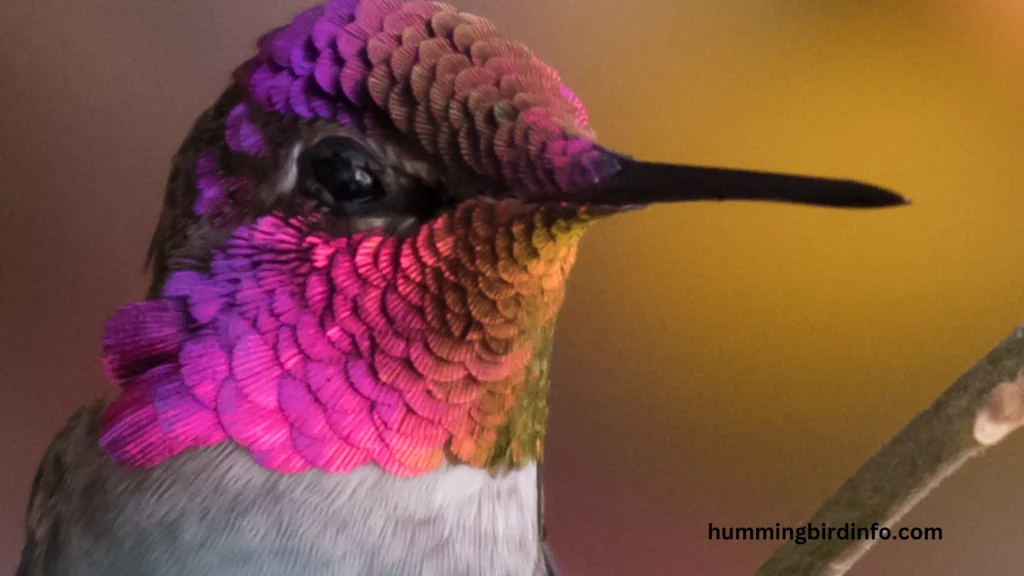
Conclusion
Finding a hummingbird on the ground is always cause for attention, but not always cause for panic. The reasons range from simple fatigue to serious injury or illness, and each situation demands careful observation.
Most often, grounded hummingbirds are victims of exhaustion, trauma, disease, or natural life stages like fledging. Some may recover on their own, while others need urgent help from humans and wildlife professionals.
We must remember how fragile and precious these tiny creatures are. Being aware, observant, and knowing how to help appropriately ensures that we give hummingbirds the best chance to return to the skies where they belong. If you ever encounter one, take a moment to assess carefully — you might just be their best hope.
FAQs
Q1. Should I pick up a hummingbird I find on the ground?
A: Only if it is clearly injured or in danger. Otherwise, observe first to see if it recovers on its own.
Q2. How can I tell if a grounded hummingbird needs help?
A: Look for visible injuries, difficulty breathing, fluffed feathers, or no attempts to fly after several minutes.
Q3. What should I do if a hummingbird is stunned after hitting a window?
A: Place it gently in a small box with air holes, keep it warm and quiet, and check after 15–20 minutes if it can fly.
Q4. Can I feed a hummingbird sugar water if it looks weak?
A: Yes, but only temporarily. Mix 1 part sugar to 4 parts water and offer a few drops until professional help arrives.
Q5. When should I call a wildlife rehabilitator?
A: If the bird is injured, bleeding, unable to move, or remains grounded for more than an hour without improvement.
Q6. Could a healthy hummingbird just be resting on the ground?
A: Rarely. It’s unusual behavior and usually suggests some underlying issue like exhaustion or minor injury.
Q7. How can I prevent hummingbirds from hitting my windows?
A: Place window decals, screens, or sun catchers on large windows to make them visible to birds.
Q8. Is it normal to see baby hummingbirds on the ground?
A: Yes, fledglings sometimes land while learning to fly. Watch for parent birds feeding them before intervening.
Would you also like me to create a featured snippet version and a meta description to help you optimize this blog post for SEO?
(Just say yes!)

